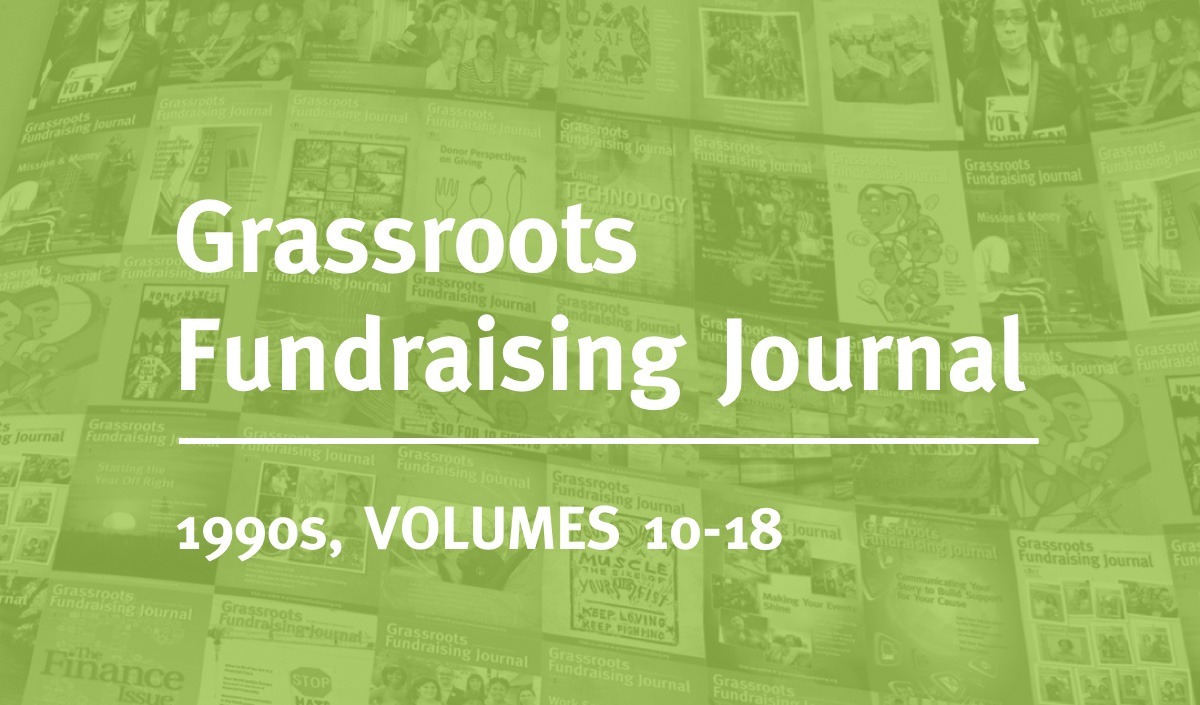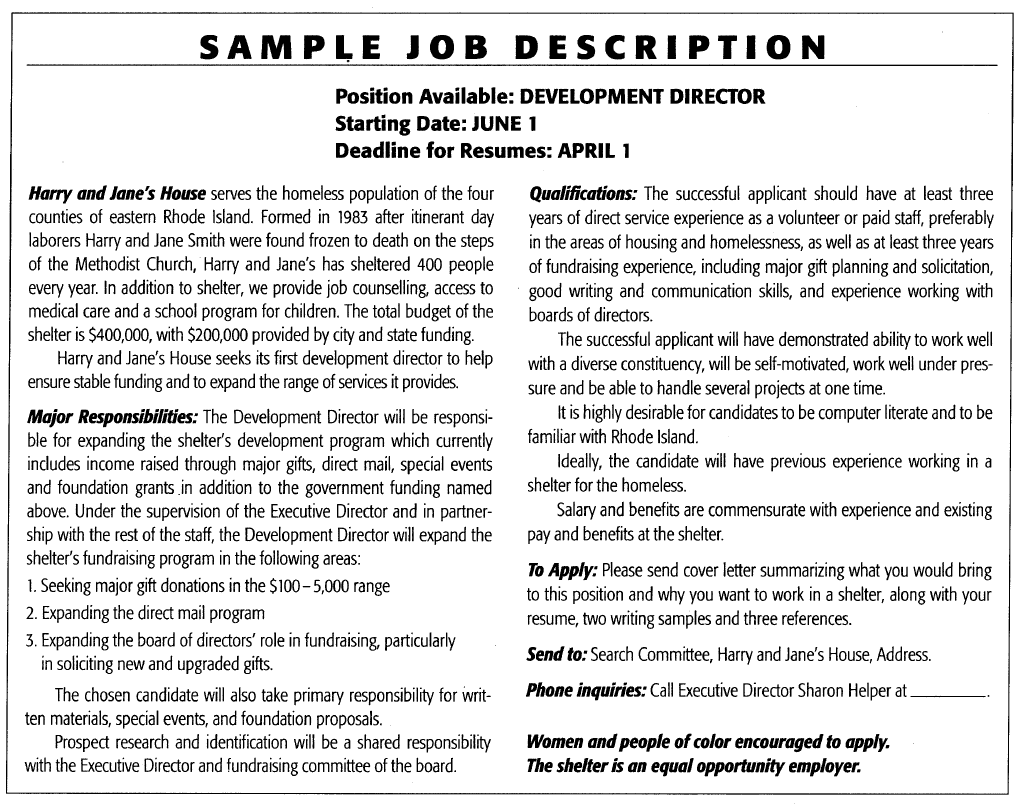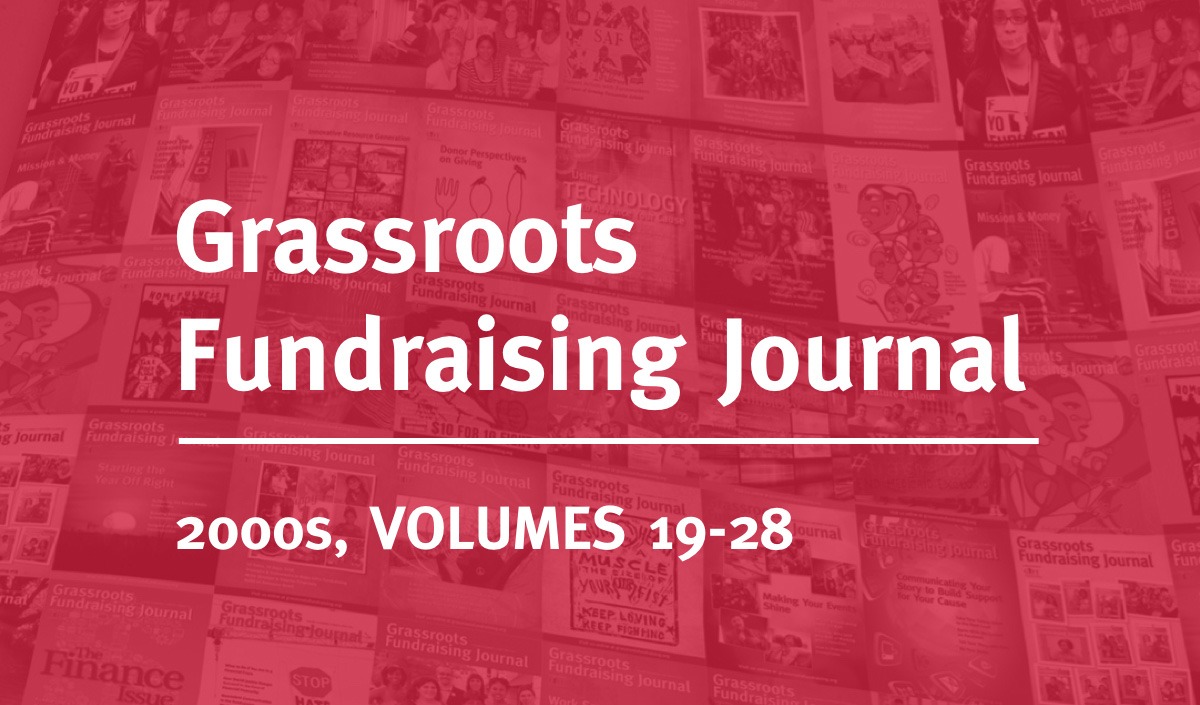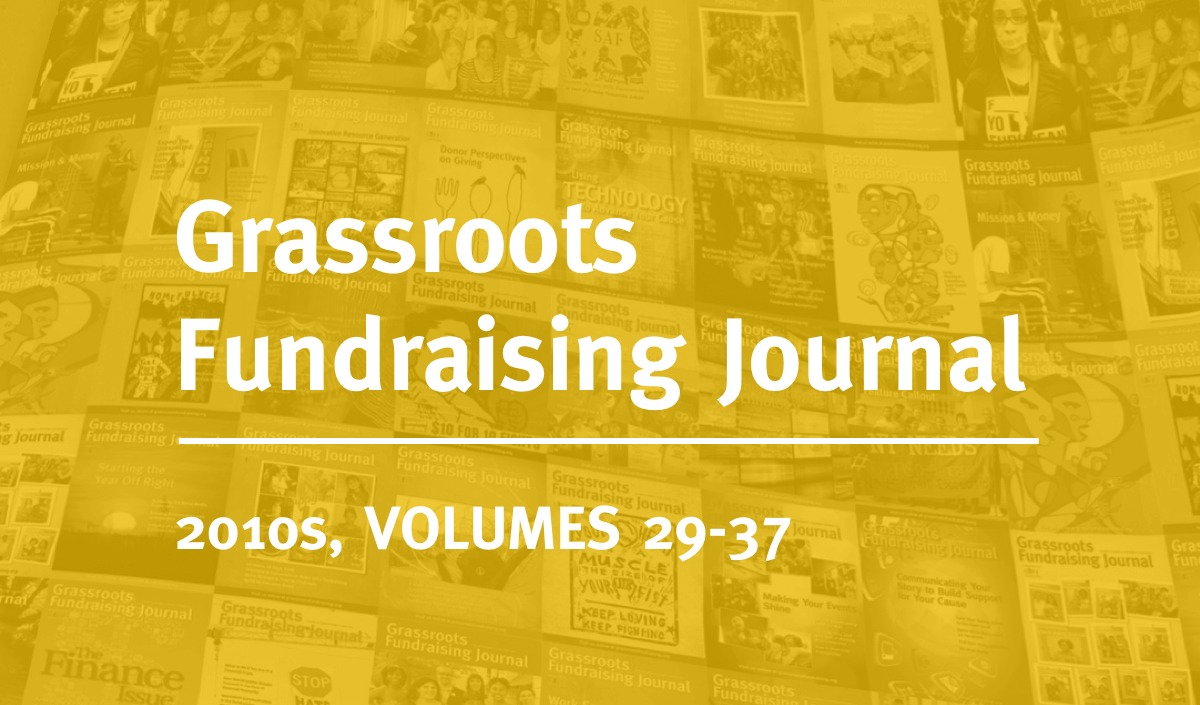
Editors’ note: This article, first published in print during August-1997, has been republished for Nonprofit Quarterly with minor updates.
The Journal hasn’t covered the topic of hiring development staff in a long time. The following article is excerpted from my book, Fundraising for Social Change, Third Edition.
As small organizations grow, they grapple with the ongoing need to raise more and more money. Inevitably, they must consider hiring someone to take charge of the fundraising function. This is a difficult decision. A group is gambling that the investment of salary- money they often barely have- is going to generate much more money than they are currently raising. And it wills, if the person is effective, the board already accepts its role in fundraising, and the organization has its basic infrastructure in place (up-to-date records, clear goals and objectives). However, there is little margin for error. What if the person isn’t skilled enough, or isn’t a good worker?
What if everything is in place, but the program takes longer than planned? How will the organization support in the meantime?
Three issues must be clarified before any decision to hire fundraising staff can be made.
1.There must be clarity as to the role of a fundraiser or development director.
It is most important to understand that the person whose primary responsibility is overseeing fundraising does not actually raise money. With the input of the board or fundraising committee, she or he plans for fundraising (developing year-long plans that spell out each strategy and set goals).
This person maintains fundraising records and the mailing list; sends out thank-you notes, or oversees that task, if there is clerical staff; reports to foundations or large donors on specific projects; does prospect research; writes and sends mail appeals; renewals and other fundraising letters; and does on major visits as needed. She or he works closely with the board, helping them make and then fulfill their fundraising commitments. This person may also write grants and research foundations and corporations, if that is a part of the organization’s plan, and there may be other fundraising strategies that he or she must oversee or implement. The development director primarily works behind the scenes, establishing a structure for effective fundraising by volunteers.
Many board members and paid staff imagine that hiring a development director will save them from further fundraising tasks. “Let’s play someone to do this so we can do the real work’” is a common and potentially fatal suggestion. While the paid fundraising staff obviously relieves the load of other staff and may relieve the boards of some tasks, everyone’s involvement in and consciousness of fundraising must stay the same or increase for the expanded fundraising program to be successful.
2. There must be clarity about what you want this person to do for your organization.
Many people wonder why the task of fundraising has so many different job titles attached to it, such as ”fundraiser,” fundraising coordinators,” “development director,” or “resource developer.“ In many social change organizations. The fundraising coordinator is called just that, in a straightforward way. In other, usually larger organizations, this position is called the director of development. Sometimes small groups think this title is a sign of elitism or an attempt to disguise the crassness of raising money, similar to saying “your support” rather than “your money” in fundraising appeals and letters. However, there are actually important differences between fundraising and development.
Fundraising is the process of bringing in the amount of money an organization needs to carry out its programs from year to year. Besides raising an operating budget, development also includes most of the following activities:
- Creating a long-range plan and updating it on a yearly basis (augmenting the case statement)
- Maintaining a planned and frequently evaluated process for bringing on new board members
- Providing fundraising training for board, staff and volunteers
- Carrying out ongoing planning and evaluation of the financial needs and fundraising plans for the future of the organization
- Developing the group’s capability to conduct capital campaigns and start planned giving programs.
One development director characterized it this way,” In fundraising, you make do with what you have. You keep the organization going and out of debt. In development, you start with what you have and you help it grow.”
3. It must be clear that hiring a development director will actually solve the problems you have.
Analysis of your situation will show whether your problems lie in fundraising or need other solutions. To begin this analysis, answer the following questions:
- Is your board active in fundraising? Does your board member participate in fundraising in some way, whether organizing special events, getting mail appeals out, or asking for money face to face?
- Does it sometimes seem that the board and perhaps staff spend more time planning for fundraising than actually raising money?
- Do board members and other volunteers involved in fundraising seem to suffer from a lack of enthusiasm?
- Is the executive director or other staff constantly pulled away from program development and organizing to do fundraising? Does he or she feel torn about setting priorities for use of time?
- Is your budget over $200,000, or do you need to raise more than $100,000 from non-government, non-foundation sources?
If the answer is yes to three or more of these questions, you should seriously consider hiring a development director. This person would direct and kindle the fundraising energies of the boards, plan for fundraising, train others in fundraising tasks, and enable program staff to get on with program work.
If, however, you need help with data entry, writing the annual report, compiling financial reports, answering the phone, dealing with the mail, handling checks, sending thank-notes, etc., You should consider hiring support staff, such as a secretary or office manager.
If your list of needs includes a better and more involved board, you need to strengthen your board and provide some motivational training for them before you hire a director.
If you want someone to help you plan and carry out a time-limited project, such as a direct mail or major gifts campaign, consider hiring a consultant.
Paying Development Directors
Imagine this scenario: An organization is debating whether to hire a development director. They have little front money so they worry about finding the right person and making a salary. As if answering a prayer, a handsome stranger shows up and offers to raise $150,000 (their budget) for a 20 percent commission. If he doesn’t succeed, he explains, they are not out anything; however, they pay him 20 percent of any money he raises. He says he can do it in six months.
Sign up for our free newsletters
Subscribe to NPQ's newsletters to have our top stories delivered directly to your inbox.
By signing up, you agree to our privacy policy and terms of use, and to receive messages from NPQ and our partners.
There are several reasons that this is an absolute no-no First, no one else in the organization is paid on commission. People are paid a salary in recognition that their work is a process and that they may be very good at their job without showing a lot of immediate progress in ending racism or stopping pollution, or whatever the group is working on.
Second, a commission tends to distort salaries. In this case, this fundraiser would be paid the director, who makes $35,000.
Third, this person will not bring his own list of contacts. He will be working with the organization’s donors. He says he has some contacts from previous jobs, but are they appropriate for your work? And do you want him taking your donor information to his next job? Further, his whole livelihood depends on donors saying yes to his requests. Even a totally honest fundraiser working under these conditions would be tempted to distort information, seeing his rent check in the eyes of each prospect. Also, many big gifts take cultivation and several visits. He may be willing to settle for a small gift in order to get it quickly rather than take the time it would require for proper cultivation.
Fourth, what will the donors think if and when they find out that 20 percent of their gift went to this temporary staff person? Few things make donors angrier than learning that a significant part of their designated gift was used for expenses.
Fifth, as was stressed earlier, one person should not be in charge of actually raising money for an entire campaign.
Suppose he is both honest and successful. When he leaves, the group is $150,000 richer, to be sure, but no wiser in regard to fundraising.
Finally, the person coordinating the fundraising should absolutely believe in the cause and be a part of the team of people putting the campaign together.
For these reasons, paying on commission is highly frowned on in fundraising and all the trade associations for fundraisers, including the National Society of fundraising. Executives, the National Associations of Hospital Developments, and the Council for the Advancement and Support of Education have issued statements decrying the practice of commission-based fundraising.
Some people in small organizations will say “That’s fine for them to say, but we don’t have the cash to hire someone and it is risky to hire a person when you can’t afford it, both for the person and for us if they are not successful.” But for all the reasons above, a small organization especially cannot afford the risk involved in hiring someone on commission.
The development director’s salary should be based on other staff salaries. If you have a collective salary structure, then it is the same as everyone else’s. If there are pay differentials, then it’s less than the director’s, but more than the office manager’s. In a hierarchical structure, the development director is a management staff person, usually reporting directly to the executive director.
Many times you hear that you have to pay “a lot” to get a capable person. This is not true. A good person for your group is someone who first and foremost believes in your group and wants to be part of it. This person will express his or her belief through fundraising, just as someone else is expressing their belief by doing direct service, organizing, or policy development. If someone who meets the criteria of believing strongly in your work has fundraising skills but can’t afford to work at any salary level you are offering, you may need to reevaluate everyone’s salary.

How to find a Capable Development Director
Once you have decided that you need a development director, you need to create a fair and accurate job description and begin the hiring process. Many job descriptions fail to attract candidates because they contain too many responsibilities. Avoid the temptation to add components to the job that are not related to fundraising or public relations. It is fair to ask the development director to edit and oversee the publications of the newsletter: it is unwise to ask that person to also be the accountant.
You should be able to describe the job in one page (see example). Think about what skills are essential as opposed to those that are desirable but not imperative. When interviewing, ask for writing samples, since writing will be a large part of almost any fundraiser’s job.
Advertise in publications geared to nonprofits. Unless you are in a small town, avoid advertising in the newspaper. (You will receive a lot of resumes of unqualified people.) Post your job description at the Foundation Center collection nearest to you and in places where social change activists hang out or shop, such as coffeehouse, alternative or women’s book stores, progressive churches, and synagogues. Send the announcement to other nonprofits and call directors and development directors that you know and let them know the job is available.
Don’t be stuck on hiring someone with all the” right” qualifications and experience. If you find such a person, look for other sorts of qualifications that are evidence of skills related to fundraising, such as running a small business, teaching, or personnel management. Any job that requires that a person be a self-starter and have experience planning, working with diverse groups of people, and good organizational skills is a good background for fundraising.
Look closely at volunteer experience, and encourage applicants to describe their work as a volunteer. Many people know more than they realize about fundraising from having volunteered. People with little or no volunteer experience are not good candidates because they will have little idea of how to work with volunteers.
In addition to broadening your criteria in hiring someone, be willing to hire a consultant for a few days to help your new staff person get a running start on their job, or send the new development director to one or two of the many classes and courses that are offered on fundraising. The theories and how-tos of fundraising are not particularly difficult to understand, even though they take a lot of work to implement. Getting someone who is under-qualified but bright, committed, and eager to do a good job is almost as good as getting an experienced person with the same attributes.









